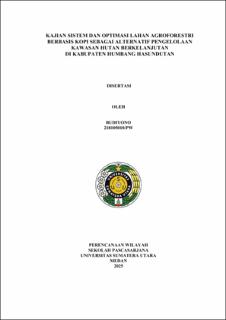| dc.description.abstract | The coffee-based agroforestry system has emerged as an innovative approach to supporting sustainable forest management, particularly in Humbang Hasundutan. This research aims to identify the diversity of coffee-based agroforestry types, evaluate their impact on forest conservation, measure their influence on farmer income and local food security, and propose relevant policy recommendations. The study subjects comprise farmers managing land with three primary agroforestry systems: agrosilvicultural, agrosilvopastoral, and agroaquaforestry.
The methodology employed includes analyses of biodiversity indices, soil erosion rates, farmer income, Minimum Living Standards (KHL), and the Food Security Index (IKP). The results indicate that the coffee-based agroforestry system contributes positively to forest conservation, with an average soil erosion rate of 16.55—which is below the permissible threshold of 25.51—and a biodiversity index (H′) of 2.85, reflecting moderate diversity. Economically, agroforestry increases the average farmer income to IDR 73,000,000 per hectare per year; however, only 30.77% of the farmers are able to achieve the Minimum Living Standard, primarily due to limited land area.
Policy analysis reveals that government support, in the form of extension services, financial incentives, and enhanced market access, needs to be strengthened in order to overcome challenges such as complex land permit regulations and limited technological adoption. The recommendations derived from this study include the simplification of land permitting procedures, the enhancement of farmers’ technical capacities, the diversification of coffee products, and the development of digital marketing channels. This research concludes that the coffee-based agroforestry system not only improves community welfare but also serves as a strategic solution for ecosystem conservation, thereby supporting sustainable development. | en_US |


